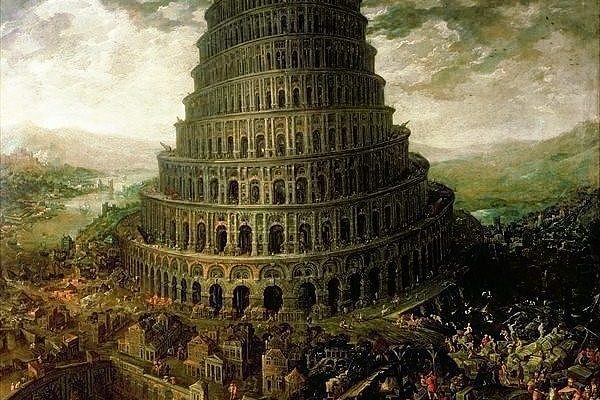The Tower of Babel is a story from the book of Genesis that sees the world at a time when it possessed solely one language and one common speech. The people congregated to Shinar and it was there that the people decided not only to build a city, but also to construct a tower that would reach the heavens. God, seeing how ambitious these mortals were and how capable they were in actualizing these ambitions, realized that because they shared one language and one common speech that they would be capable of achieving anything. Thinking quickly, God decided to disperse the people across the Earth, as well as making it so that people spoke different languages so as to confuse one another and thereby halting constructing the city. From a religious interpretation, this story is about how and why God created language. Given this past election cycle however, The Tower of Babel has never been more significant, because there are two social interpretations that exist with great tension between them, the resolution of which is of the utmost pertinence to us all.
When Donald Trump won the 2016 Presidential Election, many people particularly from marginalized backgrounds, were justifiably mortified at the prospect of a Trump presidency, and had those fears proven in the wake of his win. There was one group of people however, who were not petrified by Trump’s victory but rather, felt emboldened by it. This group is known as the Alt-Right, which is a fancier dressed way of saying white supremacists. While there has been a considerable amount written about the Alt-Right already, in an age such as we presently find ourselves, I find it is not possible for the sirens to blare too loud or too long. For this past election has not only afforded further credulity to their pernicious ideology, it may have also afforded them the power with which to actualize it.
Knowing that the Alt-Right and the racist, sexist, xenophobic, etc. ideology they embrace may be about to hit their crescendo in power and influence (I say crescendo because many would argue that these sentiments have not only been pervasive for decades but institutions of power have been imbued with them), I want to re-emphasize one of the core elements that is integral in the binding of the Alt-Right’s ideology as a whole. That being the idea of Ethno-Nationalism, which essentially amounts to the idea of ‘one race for one country.’ So in an Alt-Right world, they see prosperous societies as ones predicated on a racial homogeneity. Viewing the Tower of Babel story through an Alt-Right prism one could extrapolate from it a sense of vindication. After all, when the world was homogeneous in its language, the horizon of possibility was limitless and the prosperity was bountiful. God himself was fearful of such a people, an imagery whose allure is akin to the depictions of the Aryan race in WWII era Germany. It was only when God scattered the people across the Earth and introduced new languages or in other words, when the world shifted from a homogeneous to a heterogeneous makeup, was Utopia ultimately lost. In a modern sense we could say that rather than God being the ruin of Utopia it is rather multiculturalism, interracial relations, etc. in the eyes of the Alt-Right. A tour de force that tears asunder any and all progress for achieved by certain racial communities, because they are left in a state of confusion upon encountering the Other. Only by forcible occlusion or annihilation of the Other and creating racially homogeneous nation states, argues the Alt-Right, can we return to the project of the Tower of Babel and thereby achieve unprecedented prosperity.
Given the current social and political climate we’re inhabiting, it would appear that this interpretation is the dominant one and that the mob perpetuating their hateful ideology believe they and they alone are the inheritors of Babel. However I have another interpretation and one that I feel is crucial for all of us that stand opposed to the forces empowered by this hateful ideology to embrace. That interpretation being that the people who came together at Shinar committed the same mortal folly that we are now: They permitted the Other to manifest and therefore defeated themselves.
What exactly am I saying here? Well to answer that we must first ask what precisely constitutes the Other? The answer to that is that difference constitutes the Other. If I a man with cerebral palsy who traverses the world through the use of crutches encounter a person with perfectly functioning legs, in this encounter it is I who is the Other. The Other is comprised purely of the differences that are registered in an encounter between two people. So if the Other is an entity that is constituted by difference, how can I say their manifestation signals defeat? Does that not make me just as vitriolic as the people whom I stand diametrically opposed? It would if not for one crucial distinction. The Alt-Right utilize their perception of difference to further their notion of Utopia, I find the perception of difference which serves to create the Other as altogether disadvantageous and pernicious. Now before I go any further I should emphasize that I am not advocating ‘color blindness’ in our relation with other people. This is mainly because, to steal a line from George Berkeley, “To be is to be perceived.” So if you are perceived as different by another, you are different and this perception of difference has constructed a reality of violence, bloodshed, fear, etc. for the perceived. This reality needs to be dismantled and the dismantling must be done not by occlusion of the Other, but by the negation of its very constitution.
How do we do achieve this end? The acts can be microcosmic or macrocosmic in nature. Learning a second language, taking a cultural studies course at your college, researching world history from other countries’ perspectives, etc. If you want to take bigger steps, advocate for equal rights for women, fight however you’re able to end police brutality, make the world more accessible for people with disabilities, etc. The people at Shinar who built the Tower wanted to make a name for themselves and to become unfettered by their mortal chains, but what they failed to realize is that such grandiose aspirations are a moot point if one does not fundamentally understand themselves. They chose to forego that opportunity the moment they let the arising of new languages get in the way. In this age when Muslims, Hispanics, and refugees from a multitude of countries are berated and harassed, we must remember the wealth of knowledge both of ourselves and of the world that their lives and lived experiences possess. Gone is the age where knowing thyself is the product of intense introspection. No, the maxim for those that rebel against the malevolent machinations of this age must become Know thyself through knowing the Other and then become them. When we do this, then we can begin anew The Tower of Babel, and bear fruits of prosperity of which all of us as brethren are beneficiaries.






